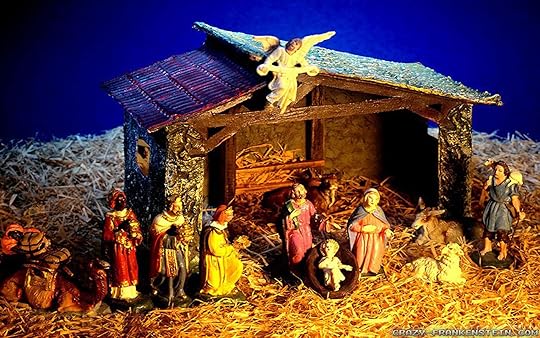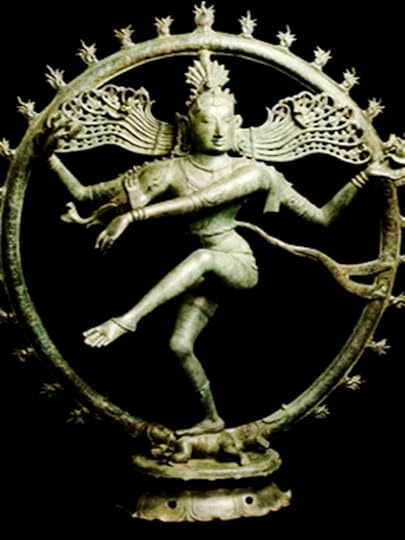Stephen Roney's Blog, page 57
December 27, 2023
Too Many Christmases
We couldn't leave Christmas without the great punk Christmas anthem. But I had to delay it so as not to kill the mood of the day itself.
Yet this, or something like it, is too often the reality of Christmas for many.
Many are spending this Christmas in tents, or in abusive families. There is a small tent city within view of the doors of the cathedral here in Saint John, in the shadow of its spire.
The First and Last Noel
“No Hell, no Hell, there is no Hell.”
My father, as a child, heard the refrain of the familiar Christmas carol this way. He took it as the essential Christian message.
Many do. After all, Jesus died for our sins, right?
A priest argues that the greatest danger to the faithful is not atheists, but universalists within the church; and he argues that universalism is the source and essence of what is going wrong in the church today.
Universalism is the idea that no one is in Hell. It is indeed a popular thought among the Catholic clergy. Bishop Barron has expressed this opinion, as at least a possibility: “we can hope.” The original translation of the Novus Ordo mass in English used to intone every Sunday that Jesus died “for all” –a deliberate change from the previous Latin “for many,” as if to promote the universalism heresy.
And it is a heresy; declared so in the times of Origen, who first propounded it.
It makes sense that this might well be behind the current push to “pastorally” downplay objections to divorce, pedophilia, same-sex unions, and the like. After all, why make such a fuss about sin, if nothing is really at stake, if we all end up in the same place? Then judgement only becomes unkindness, an extra burden on the shoulders of the “faithful.” Religion should be all about joy and forgiveness.
Happy, happy, joy joy. Who cares, after all, about beheaded children and the like?
Even if there is no Hell, this is not kind or charitable. All morality boils down to “love God and love your neighbour.” Turning a blind eye to sin is condoning predation on the vulnerable. The strong can look after themselves; the sufferings of the weak will multiply.
But if God exists, he must be good; for goodness is an aspect of perfection. And we know, through multiple rational proofs, that God exists. If God is good, he must be on the side of justice, for that is what goodness means. He must have created the world in such a way as to ensure ultimate justice.
Yes, there is also mercy. But mercy requires repentance and penance; it cannot be accepting and condoning the wrong. Otherwise, the wrong is itself eternal; there is wrong in Heaven.
Therefore, there must be a Hell. There must be some permanent punishment for those who do not repent and will not willingly make full recompense for their sins.
Preaching that we all get to Heaven anyway is ushering souls into Hell, and denying them the hope of mercy.
'Od's Blog: Catholic comments on the passing parade.
This Nativity Thing

Friend Xerxes, for his Christmas column, sought to parse the nativity narrative as a short story. As a pedant, I feel he did not get it right; but the exercise, I think, is interesting.
He had the Christ child as protagonist. But this does not work. The protagonist must be the main character in the story. He must be someone who has a problem, or an unfulfilled desire. The plot is then the working out of that problem or desire.
Jesus does not qualify, as he appears in the story only towards the end. And, even if he is conceptually the main focus, as Logos, he cannot be said to have a problem. Nor, as an infant, can he be aware of many.
Who has a problem? Mary and Joseph have problems; but these are several, and apart from the main theme of the piece.
The protagonist in the story is mankind. Or rather, that portion of mankind who hunger and thirst for righteousness. “Those with whom the Most High is well pleased”; represented in the story by the shepherds and the wise men. Their hope is for a messiah, who, when he comes, will establish universal justice.
Who then is the antagonist? Who is attempting to prevent justice from beginning its reign?
Most obviously, King Herod; who kills every male child under two years old in hopes of preventing the messiah. Less obviously, Augustus Caesar, whose census and tax, his desire for control, has forced Joseph and Mary into a perilous situation—perilous for the child in her womb.
The problem is not Herod alone, but two separate governments. In other words, the antagonist of righteous men is government in general. Government is, literally, in the nativity story, the antichrist.
Not that we can do away with governments. Governments serve a necessary purpose: in the words of the Code of Hammurabi, “to prevent the strong from oppressing the weak.” In the words of Thomas Jefferson, “to secure these rights, Governments are instituted among Men.” There is perhaps a representation of honest government, too, in the three kings. Perhaps—but they are not identified as kings in the gospel.
However, if the purpose of government is “to prevent the strong from oppressing the weak,” there is in this an immediate problem: government is stronger than anyone. What is to prevent it from oppressing the weak? Who polices the police?
Hence Locke’s and Jefferson’s concern for government overreach; it is already there at the heart of the gospel. But democracy is itself a flawed mechanism; although a check on the powerful, it also gives power to a majority to oppress a minority. You kind of need divine intervention.
We are seeing unprecedented examples of government overreach right now. We need the Messiah this Christmas more than ever. We must scan the heavens for a star, or some choir of angels
Oddly, we are suddenly hearing many reports of UFOs.
'Od's Blog: Catholic comments on the passing parade.
December 26, 2023
More Canadian Church Burnings
More Problems with Claudine Gay
Here's the Leading Candidate to Replace Harvard
'Od's Blog: Catholic comments on the passing parade.
Canadian Cream
Courtesy of the Poilievre family. Some Irish/Venezuelan/Canadian cultural fusion.
St. Stephen's Day
It's All about Me, Right?
were we led all that way for
Birth or Death? There was a Birth, certainly
We had evidence and no doubt. I had seen birth and death,
But had thought they were different; this Birth was
Hard and bitter agony for us, like Death, our death.
Elizabeth Gilbert wrote a travel memoir titled Eat, Pray, Love, in which, following a divorce she initiated at 34, she travels to Italy for the food, then to India for the spiritual insight, then meets and marries a man in Bali. (They have since divorced.) It has been made into a movie, starring Julia Roberts.
It sounds to me like a parody of the rootlessness and frivolousness of modern life in the developed world, existential angst among the Karens. But Oprah Winfrey loved it. Friend Xerxes also takes it seriously, and cites as revelatory the author’s key insight: “God lives in me, AS me.”
One understands how this is something she might have picked up in India. “Tat tvam asi,” “That art thou”: “that” being Brahman, the undifferentiated Godhead. Brahman-Atman, a common formulation of Advaita Vedanta Hinduism; monism. “All is one.”
It is not clear to me, however, that it means what she thinks it means. It is dangerous to parachute into a foreign religious tradition with your own prior assumptions. You can get thing backwards.
It means that the individual self is insignificant and transitory, like a raindrop falling into the ocean of Brahman. Or like a momentary hand gesture of the dancing Siva, the glitter of a sequin on his thigh. I suspect Gilbert, her acolytes, and Xerxes are reading this instead in the Satanic way: “I am God, and there is no other God before me.” Fatally wrong.

Monism, Advaita Vedanta, is more popular with foreign spiritual tourists than with Indians. Buddhism objects to the “Brahman-Atman” formulation with its counter-doctrine of “anatman”: “there is no self.” Precisely because of the danger of misinterpretation. It is self that must die, not God. Others object that “All is one” is a meaningless statement: one compared to what? And then there is Ramakrishna’s succinct practical observation: “I want to taste sugar; I don’t want to BE sugar.”
Among actual Indians, Advaita Vedanta has been mostly supplanted for centuries by devotional Vaishnavism.
The issue is that one must “die to self.” “He must become greater; I must become less.” C.S. Lewis writes: “The very first step is to try to forget about the self altogether. Your real, new self will not come as long as you are looking for it. It will come when you are looking for Him.”
In the Gospel of John, Jesus says we must be born again. That is one way to put it. But in order to be born again, we must first die in some sense. It is the death of the will.
'Od's Blog: Catholic comments on the passing parade.
December 25, 2023
Have Yourself a Nazi Little Christmas



